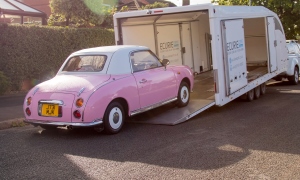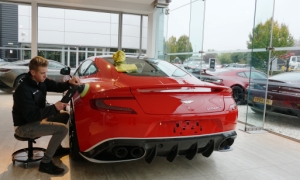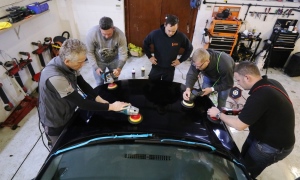Car Care Insurance
It is essential for car care professionals to have the correct insurance for the services they offer. For PVD members we have a set of mandatory requirements that vary depending on the services offered, along with a set recommended levels of cover. The mandatory requirements are primarily there to protect the customer, while the recommended policies are suggested because they protect the member and their business.
- All members require PLI & Accidental Damage to Goods Worked on
- Members with Units require custody & shunting recover as a minimum
- Members who offer collect & return need a trade driving policy
- Members who offer training require Professional Indemnity
- Members who work on boats and or aircraft need specific cover


Public Liability
Public Liability Insurance, often referred to as PLI, is not a legal requirement in the UK. However, we feel it is essential for any car care professional to protect them, their clients, and third parties. PLI cover is often not that expensive for car valeters and detailers, with some policies costing around £50-£80, however it is essential to understand what is encompassed within the policy. For example, generic PLI cover usually has an exemption for damage to vehicle worked on (sometimes referred to 'goods worked on'). So if you cause damage to your customer's car, the insurance doesn't cover it, which is why a second mandatory requirement for all members is accidental damage to goods worked on.

Accidental Damage
Accidental Damage cover is usually incorporated into other policies, be it a PLI or trade driving policy, rather than an additional stand alone policy. While many may think that a scratch or burn through is the sort of minor damage a valeter or detailer can just pay for if it happens, the fact is that we have seen much larger claims fall into this bracket. For example, if working on a high value car with a specific paint finish, a much larger area may need to be resprayed by specialist bodyshops, which can cost thousands of pounds. Equally, there are some classic cars with original paint that if damaged, lose tens of thousands in value as the originality has been lost. We also see component damage leading to much larger claims than you might expect - damage an interior display screen and the entire dashboard system needs pulling out and replacing. Cleaning an engine bay can lead to ECU damage, which on even cheaper vehicles, can run into four-figure costs.

Custody Cover
When a vehicle is in your custody, you are wholly responsible for it. Should the vehicle be stolen, or damaged in a fire, or even spontaneously combust of its own volition, you are responsible. In some circumstances, the owner's insurance on the vehicle will reimburse the owner, but that insurance company will then pursue you, the custodian, for not only the payout, but also the administration costs.
Imagine taking your car to a dealership, and it is stolen. Would you expect to have your insurance company cover the cost, and for you to pay the excess, and for you to potentially loose your no claims bonus, and for you to suffer higher premiums for the next five years? You would expect the dealership insurance to reimburse you, and the same is true if you have a clients vehicle in for detailing.
Custody cover is sometimes difficult to find in isolation, more often than not it is necessary to get a trade driving policy which includes it. This is particularly true when it comes to shunting cars in and out of, or around your unit. Many think that as units are often not on the public highway, they don't require insurance to drive customer cars short distances. In some cases, legally speaking, this can be correct. However, should damage arise from a foot accidentally slipping off a clutch, or an engine deciding to detonate when you start it, you are still liable for the damage.

Road Risk
Trade driving policies are often expensive, but for most who offer unit-based services, they are becoming the most economical route to getting the total cover required. While those with historic motoring or criminal offences, and those under thirty years old, will get stung the most, there are few policies out there for under £1,000 per annum. However, it is worth looking at the benefits. For a start, you can often add your personal cars and spouses to the policy, along with employees - thus saving you money personally. You can also consider adding extra services for your clients, such as collection and delivery. Consider also getting trade plates at the same time.

Sub-Contracting & Trade Work
Detailers are often asked to work for dealerships or other detailers, at which point you become a sub-contractor. It is essential to check your own policy and that of the company you are subcontracted to, in order to establish both whether the insurance is valid, and who holds the liability should the worst happen. Many policies allow for subcontractors under prescribed conditions, but it is always best to check.

Ancillary Services
Many detailers offer a range of extra services that in our mind might be considered part of detailing, but in that of the insurer, are often considered a different activity. PPF is a good example - to someone in the trade it would be considered a legitimate part of paint protection and thus come under the detailing banner. However, unless your policy states that you are covered for damage resulting in the application, removal, or repair of PPF, you may well not be covered. Brake calipers are another example - repainting them is a common service offered by detailers, but it is often not covered, particularly if they are removed in order to do so. Even removing the wheels for thorough cleaning and coating can be in breach of some policies, let alone alloy wheel refurbishment or the fitment of rim protectors. Make a list of all the services you offer, or plan to offer in the near future, and send it to your insurer to make sure they are all covered, and get it in writing.

High Value Vehicles
Many more basic policies will only cover vehicles with values up to £25k, whereas many customers who want their car detailed will have vehicles well in excess of that value. Generally speaking, it would be advisable to have cover for vehicles up to £75k or £100k, and then if a vehicle of higher value comes in, phone your insurance and get temporary cover on that vehicle. Owners of high value cars generally prefer to pay a premium to ensure their car is covered, so you can pass at least some of the cost onto them.

Cars vs Vehicles
Most policies stipulate the type of vehicle they cover, the most common being passanger cars. However, some do not specifically stipulate what vehicles are not covered, yet don't offer cover on commercial vehicles, agricultural vehicles, leisure vehicles like caravans and horseboxes, or even normal trailers. With insurance you don't want to take the risk - if it says what sort of vehicle is covered, assume that any other sort of vehicle isn't covered. Equally, if you are likely to work on commercials or caravans, get it in writing that these are covered.

Boats and Aircraft
It is not uncommon to be asked to work on marine or aviation vehicles, but you need to be very careful when it comes to insurance. Firstly, the vehicles themselves need to be covered, just like a car would be. Secondly, the working environment needs to be considered - working at an airport, particularly near active runways, has a much higher risk than working on a driveway, and thus insurance companies charge a premium for it. A standard PLI policy is unlikely to cover you at aerodromes or on marinas - always check, always get it in writing.

Live Events
Many valeters and detailers attend shows in a professional capacity, either to have a stand promoting their business or to look after vehicles while they are on display. Working at a show or exhibition often requires extra cover - some event organisers demand up to £5 million PLI cover. Before agreeing to work at a show, or exhibit at one, it is essential to find out what insurance will be required, and how much that will cost.

Training
As a car care professional, offering training can be a nice additional income stream. However, you will need to have additional insurance policies to cover you, and they will have various stipulations as to what you can offer. Firstly you need to ensure your public liability and accidental damage cover remains valid when training one or more people. Working on your own in a unit presents less risk than teaching five people in a busy working environment.
Secondly, you will need to get professional indemnity insurance - this covers you should your trainees cause damage during or after the training session as a consequence of your tuition. There will also be caveats to training - such as not using a customer vehicle that has come in for a paid service as a training vehicle. Thus offering a service whereby you detail a customers car and train them on it at the same time needs to carefully managed. Remember that you will need PI cover for at least seven years after you have done your last training session - it is quite a commitment.

Personal Injury
While car care is not considered a highly dangerous activity, those doing it on a daily basis regularly get work related injuries. This could be a repetitive strain, a slipped disc, or even knee problems. Though they might manifest themselves over time, they are still considered an injury, and thus having cover to ensure you can get the best treatment is well worth considering. We are blessed with the NHS in the UK, however, waiting lists are long and there are many treatments that are only available with private health insurance. These treatments can often lead to faster recovery times and fewer missed hours of work - protecting yourself and your ability to work protects your business.
Loss of Income
In the event of an injury, be it physical or mental, it is sometimes impossible to work, or at least work at the same rate. If you can't work, and don't have income insurance, a business can fail very quickly. Income insurance is an affordable option to give you, your employees, and your family piece of mind. There are various options out there, and for a small monthly fee you can rest easy.

